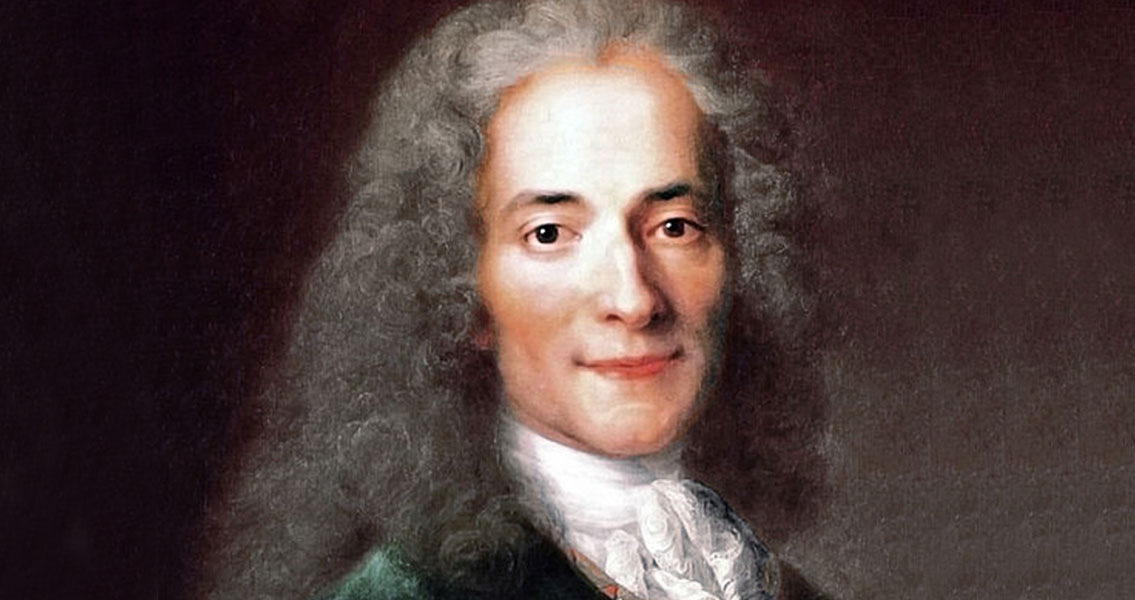<![CDATA[This week marks three hundred and twenty years since the birth of Francois-Marie Arouet, or Voltaire, as he is more popularly known. Regarded as one of the leading lights of the French Enlightenment, the most resonant feature of Voltaire's work for modern readers is its brilliant satire. Anyone who has read his masterpiece 'Candide' will know that the book is written with a wit and dry humour that feels surprisingly modern. Voltaire was as much of a rogue in life as in his writing. Born into an upper middle class family in Paris, he had a close relationship with his free thinking godfather, something which would have a profound effect on his writing. He had a strict Jesuit education, during which he began developing his flare as a writer. He later abandoned his training in law to pursue his career as a writer full time. His early poetry was well regarded but incredibly controversial, and frequently landed him in trouble with authorities. In 1717 he was arrested and placed in the Bastille, the infamous Parisian prison, for a year, following the publication of his work 'La Henriade'. The epic poem offended French politicians with its satirical criticism of religion and politics, two themes Voltaire would keep returning to. While imprisoned he assumed the pen name 'Voltaire', under which he would write his most famous works. The Bastille failed to tame Voltaire, if anything it made him pursue his satirical agenda with an even greater fervour. He continued to attack church and government with brazen audacity. He criticised religious persecution, tyranny and injustice, while standing up for the poor and unfortunate in society, working as an outspoken campaigner for social and political reform throughout his life. He passionately continued his endeavours despite frequent conflicts with law makers, to the extent that he purchased an estate on the French-Swiss border, just so he could easily flee whenever the French authorities came to arrest him. Candide was published in 1759. As well as being Voltaire's most famous work, it is the most direct in its satire. A short novella, it tells the tale of the eponymous protagonist, the illegitimate heir of a German baron. Candide is in love with a woman from a higher social class. He endures great hardships in his attempts to win her over, witnessing the worst excesses of wealth, religion and power. A key feature of the novella is a constant criticism of philosophy, and in particular some of the key ideas of the Enlightenment. Early in the story, Candide's tutor Pangloss argues that they are living in 'the best of all possible worlds'. This is a thinly veiled criticism of the Enlightenment belief that through rational thought the world could be perfected. Frequently throughout the story characters become overly fixated on abstract philosophical ideas, failing to appreciate the dangerous reality of the world. Like all the best satirists, Voltaire was just as willing to comment on those close to him, as he was on those he viewed as enemies. The corruption of religion is another central theme to the book. The story features a Pope who has a daughter (despite his obligatory vow of celibacy), a Grand Inquisitor with a mistress, and a Franciscan Friar who doubles as a jewel thief. Organised religion is portrayed as irrationally oppressive, with the Grand Inquisitor seeing to it than anyone who disagrees with him on the smallest theological detail is heavily punished. It shouldn't be assumed that Voltaire had a total hatred of religion however. Throughout the story, everyday religious followers tend to be shown in a positive light. There are countless other themes covered, far too many to discuss here. One of the most remarkable things about the book is that it deals with so much in such a short story. What really makes it timeless, and gives it a universal appeal, is the humour with which it satirises existence. Many of the jokes and observations in the book seem just as relevant now as they would have in eighteenth century France. A conversation between Candide, and Martin, a deeply pessimistic scholar, reveals much of the dry wit and themes that make the book still feel so relevant today; "'You're a bitter man' said Candide. 'That's because I've lived,' said Martin" More than remembering an Enlightenment thinker, the anniversary of Voltaire's birth is a great time to remember one of history's greatest satirists.]]>
Candide
